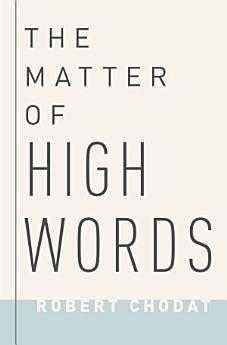The Matter of High Words: Naturalism, Normativity, and the Postwar Sage
Robert Chodat
Aug 2017 · Oxford University Press
Ebook
336
Pages
family_home
Eligible
info
reportRatings and reviews aren’t verified Learn More
About this ebook
In a world of matter, how can we express what matters? When the explanations of the natural sciences become powerfully precise and authoritative, what is the status of our highest words, the languages that articulate our norms and orient our lives? The Matter of High Words examines a constellation of American writers who in the decades since World War II have posed these questions in distinctive ways. Walker Percy, Marilynne Robinson, Ralph Ellison, Stanley Cavell, and David Foster Wallace are all self-consciously post-WWII authors, attuned to the fragmentation and skepticism that have defined so much of the literary and critical culture of the last century and more. Yet they also attempt to reach back to older forms of thought and writing that are often thought to have dried up-the traditions of prophecy, of wisdom literature, of the sage. Working within this dual inheritance, these authors are drawn equally to both art and argument, "showing" and "telling," shifting continually between narrative and discursive genres. In their essays they act as moralists, promoting the broad, abstract concepts that might inspire action in the face of naturalistic reduction: community, family, courage, fraternity, marriage, friendship, temperance, judgment. In their narratives, they offer particular lives in particular settings, thick descriptions that give flesh to such high words. Rarely do these movements between genres generate a tidy equilibrium; where their essays speak of cooperation and redemption, their narratives display alienation, loss, and failure. But in pursuing such risky, unorthodox strategies, these postwar sages are not only able to challenge some of the dominant naturalistic theories of the last several decades: cognitive science, neo-Darwinian theory, social science, the fact-value divide in analytic philosophy. Through five chapters of detailed analysis and close reading, Chodat explores the question of whether vocabularies of ought and ought-not can still emerge today, and how these concepts might be embodied, and whether such ideas might be found in things.
About the author
Robert Chodat is an Associate Professor of English at Boston University, where he specializes in post-WWII American fiction and the relationship between literature and philosophy. He is the author of Worldly Acts and Sentient Things: The Persistence of Agency from Stein to DeLillo (2008).
Rate this ebook
Tell us what you think.
Reading information
Smartphones and tablets
Install the Google Play Books app for Android and iPad/iPhone. It syncs automatically with your account and allows you to read online or offline wherever you are.
Laptops and computers
You can listen to audiobooks purchased on Google Play using your computer's web browser.
eReaders and other devices
To read on e-ink devices like Kobo eReaders, you'll need to download a file and transfer it to your device. Follow the detailed Help Center instructions to transfer the files to supported eReaders.





